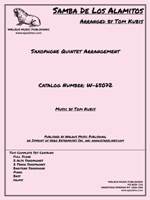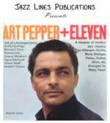HALF STEP DOWN PLEASE [DOWNLOAD]
Arranged by Jeffrey Sultanof

Cat #: W-65068DL
$50.00This product is available for immediate download after purchase.
Questions?
Please call +1-518-587-1102 or email us.
Audio Sample:
Edition: Jazz Big Band Arrangement
Description: Swing - Difficult
Publisher: Walrus Music Publishing
On December 11, 1947, a group of nine musicians gathered in RCA Victor's recording studio under the leadership of Coleman Hawkins to make several modern jazz recordings. One of the pieces recorded that day was Tadd Dameron's 'Half Step Down Please.' Dameron himself was not in the studio; he was recording with Dexter Gordon as a pianist.
The piece was not copyrighted until 1964, when it issued on one of the first RCA Victor Vintage Series LPs, a program of reissuing tracks in the RCA vault that ranged stylistically from jazz to country to pop to Broadway. Interestingly, Coleman Hawkins is listed as a co-composer, which is probably not the case.
The lead sheet on file at the Library of Congress reveals that the nonet did not play the melody correctly in bars three and five. Presumably Dameron would have heard this and corrected it, but obviously he could not. In 1962, he would say that he had little use for any of the recordings made of his music, but that could have been because he had just gotten out of jail and was resuming his career.
There is no record of Dameron having arranged this for big band, and that is understandable given that he was leading octets and nonets and writing new music in and around New York during 1948-9. For years I wondered what he would have done if he had arranged this piece for a large group, and when the opportunity arose for me to write a new series of arrangements for Walrus Music Publishing, I decided to make this one of the first settings - and get one more Dameron piece into active circulation for those who love to play and study his music.
I write music for professionals that is also playable by high schools and colleges; my model in this attitude is the work of Benny Carter. His music plays nicely, is considerate of the players, and is fun to play. I aspire to these goals in my work. In my view, the melody and harmony of a jazz composition should dictate what the treatment would be in setting it for an ensemble. Dameron was unique in that he wrote for Dizzy Gillespie and Sarah Vaughan, but his music was also played successfully by Jimmie Lunceford and Count Basie. A straight-forward approach was what I felt this piece warranted since it strides both swing and bebop, although I have used dissonance and various modern techniques throughout. The concept of the music moving down chromatically using ii – V pivots is very bebop, but is also fresh and challenging to the modern player. There are short solo opportunities for several players, and the piece can be opened up further for more solos.
It is tempting to play this faster than the stated tempo indication, and I ask that the leader/teacher err on the side of slower, particularly since the unison figures at the end can sound messy when played too fast. This should sound relaxed and gentle; the tempo should also be danceable. I like to create arrangements that can be used in many ways. I hope you enjoy playing this.
--Jeff Sultanof
2 Alto Saxophones
2 Tenor Saxophones
Baritone Saxophone
4 Trumpets
4 Trombones
Guitar
Piano
Bass
Drums
Trombone 1: Bb4









